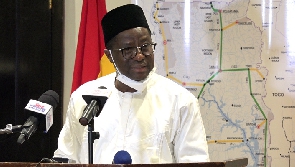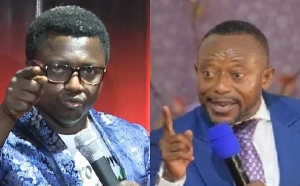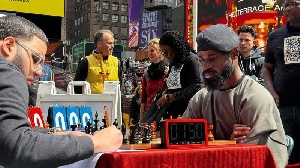Opinions of Tuesday, 22 May 2007
Columnist: Boateng, Kofi A.
ROPAA and the Elections in 2008 – Part 2
On May 2- 4, 2007, Ghana’s Electoral Commission hosted a conference in Accra to learn from the experiences of other countries in implementing overseas voting. Representatives from electoral management bodies in Mexico and Mali were in attendance. The conference was sponsored by the Stockholm based - International Institute for Democracy and Electoral Assistance (IDEA). The theme was not whether ROPAA should be implemented now or later but how to ensure that the majority of qualified Ghanaians Living Abroad (GLAs) exercise their constitutional franchise when the ballot box goes to them and avoid the bad experiences of other countries. I offer below the experiences of three countries in overseas voting: Mexico, Senegal and Cape Verde.
MEXICO
At the IDEA meeting in Accra, a representative from Mexico, Carlos Navarro, is reported to have cautioned Ghana to implement its new law only slowly. The Ghana law came into being after a parliamentary vote; and signed by the President on February 24, 2006 as the Representation of the People’s Amendment Act (ROPAA). It accords its citizens living abroad, who are 18years or older and of sound mind, the right to vote in Ghana’s national elections. Previous to the February 2006 amendment, only Ghanaians serving in military missions abroad, foreign service personnel and government–sponsored scholarship recipients could vote in Ghana’s elections from abroad. The new ROPAA extends this constitutional right to the bigger group of GLAs. Mr. Navarro added that it took Mexico nine years from the passage of its bill to its implementation and then the results were dismal. Let us remove the veil from the Mexican story and identify where things actually went wrong for Mexico so Ghana does not repeat them. I do not know whether Mr. Navarro was misquoted but Mexico passed its law to extend the voting franchise to its estimated 10 million living outside the country in February 2005 and the actual voting was done in July 2006. Perhaps Mr. Navarro meant to say that the issue was debated for nine years; similar to Ghana’s that was started during the NDC administration. Mexico’s historic law restricted voting by Mexicans Living Abroad (MLAs) to only Presidential elections. (Though Ghana’s law in contrast is inclusive of all national elections an initial implementation phase could concentrate on the Presidential only to minimize mishaps). It was expected that some 4 million MLAs would vote either in person at the embassies and consulates or by mail-in absentee ballots. The actual result was that the absentee ballots only yielded 57,000 according to a later study by the Pew Hispanic Center. Certainly, the first-ever attempt by Mexico to allow absentee ballots from its MLAs was anything but a success-why?
In the Pew study they found that about half of the Mexicans interviewed said that they did not receive enough information to know how to register for the absentee vote or that the procedures were too difficult and complicated. Only 7% of those polled correctly stated the deadline for voting; that they could vote by registered mail; and knew the credentials required to register. The lesson that should be learned from the Mexican experience is that early voter education is a MUST. Clarity of communication of the requirements for eligibility is PARAMOUNT and simplicity of instructions is VALUABLE. Mr. Carlos Navarro told his audience in Ghana that Mexico with greater resources than Ghana could not succeed. What he failed to add is that the Mexican Federal Election Institute budgeted some $140 million to implement its first overseas voting but received only $17.5 million (12.5%) - The lesson is that you get what you pay for and don’t be too proud to ask others for help. I don’t think Ghana has a problem in this department since over 40% of its elections’ costs are currently underwritten by international bodies. A persistent refrain of opponents of Ghana’s ROPAA is that the ruling government will use it to steal elections. Of course whichever party is out of power will accuse the other of such ill-will - such is the nature of politics so let us move beyond that. The 2006 Mexican election was the closest in its history; 35.9% (15 million) voted for the winning candidate versus 35.3% (14.8 million) for the closest second. In the predictable ensuing protests no one ascribed blame to malfeasance in the administration of the overseas votes.
SENEGAL
Senegal has had two elections in which Senegalese Living Abroad (SLAs) have voted- first in 2001 and then most recently in 2007. There are an estimated 60,000 Senegalese living in the United States but only 4,755 registered to vote for the 2007 election. SLAs have been limited in these initial overseas elections to Presidential only with plans to include them in legislative elections as the system matures. According to the Columbia Journalist, voters for the 2007 Presidential elections complained of the delay in receiving their new electronic voter identification cards. All Senegalese voters, both at home and abroad, had to apply for the card, which includes their picture and digitized information (similar to Ghana’s National ID card exercise).The cards destined for the U.S never arrived in time for the election, and duplicates were made, delaying the process. Several Bronx, New York, voters arrived on the election day with their receipt to prove they had registered, and picked up their card in the polling station right before voting.
Despite the problems, voters were not deterred. People made their way to exercise their right to vote, and to maintain their deep-seated connection to life back home. "Politics represents a person's priorities in life, if you don't participate, they will make the decisions without you." said Youssouphe Ba. "It is my duty as a citizen to vote," said Mariama Massaly, a first-time voter. "If I did not vote and something bad was to happen, I would feel responsible that my vote could have made the difference." Once again the lesson is clear- early preparation; communication of expectations and well-managed logistics are imperative for success and participation. Yes, the desire to participate is there and translates into numbers with clear and advance communication.
CAPE VERDE
On the African continent Cape Verde has the longest history of participation in its elections by Capeverdians Living Abroad (CVLAs), going back at least sixteen years. Cape Verde has progressed beyond Presidential-only elections for CVLAs to include them in the National Assembly Elections. In the 2001 Presidential Elections 32.7% of the registered CVLAs voted compared to 59% of the total votes; and in 2006, the percentage of registered CVLAs who voted was 22% compared to 53% of the total voters. In the 2006 elections, CVLAs living in Africa recorded the highest number of participation (43%), followed by those in the USA (24%); and 16% in Europe. It is no accident that well over 25% of Cape Verde’s Gross Domestic Product of $3billion comes from the remittances of its CVLAs. The 2007 Cape Verde Presidential election was the closest in its history with the winner, Pedro Pires, getting 86,583 (50.98%) of the votes against his opponent, Carlos Veiga getting 83,241 (49.02%). The results were accepted and no one indicted the CVLAs’ votes as fraudulent.
Lessons from the Cape Verde experience are encouraging. Certainly most voting overseas do not yield huge turnouts in the beginning (which belies all the fears and calls to wait beyond 2008 for Ghana). However when overseas voting is implemented consistently and with clear and early communication of all requirements and logistics, it fosters improved participation; citizenry is inclusive and this eventually translates into economic gains for the country far outweighing the financial cost of conducting the overseas elections.
So forward march, Ghana and 2008 is just the time to implement ROPAA but don’t wait until November 2008! We must expect to learn and improve as we go along and no learning will occur if the activity is forever postponed. No one makes light of the energy crisis currently facing Ghana. That is one of several developmental issues the country must deal with and when this is overcome something else will crop up- such is life. Could one method of solving our myriad and continual flow of problems be a more active and organized engagement with GLAs in ways that encompass money, skills, ideas and even taxes through treaties with their countries of domicile? Don’t read me wrong- I am not making the payment of taxes a criterion to vote since that is not part of Ghana’s constitutional requirements to register. I am speaking about going beyond the first toll gate and let the goodness and mercies of GLAs follow always into our country- register them and draw them in via the voting exercise.
By the way, it may be fun for an opposition party to walk out on meetings and parliamentary votes on issues not to their liking such as ROPAA but it is interesting that Ghana’s current Constitution of 1992 was approved by a parliament that did not include the current ruling group yet they respect it as the law of the land and are working with it. Why then, can’t we come together to make the same constitution work for all? The law has been passed. The democratic process sweeping Africa and the growing globalization cannot be stopped. Candles must be lit rather than curse the darkness (no pun). All the major political parties will do well to come out of their shells and develop strategies for voter education of GLAs. This will mean cooperating with the Electoral Commission and not shunning or boycotting their invitations. That will only hurt one’s cause as advantage is yielded to the opponent simply based on unfounded and unscientific fear. GLAs should on their part flock to Ghana Missions to file for their dual citizenship papers and get themselves ready to be part of history. Change is not easy but embracing it has boldness and opportunity embedded in it. May Ghana be the first country to score the highest percentage of first time overseas voter participation in the world’s history come December 2008. The record is there to be claimed but we must all cheer the same team just as we did for the Black Stars at the 2006 World Cup. We may wear different political colors but there is only one team- Ghana- and one goal- progress that includes all at all times.













